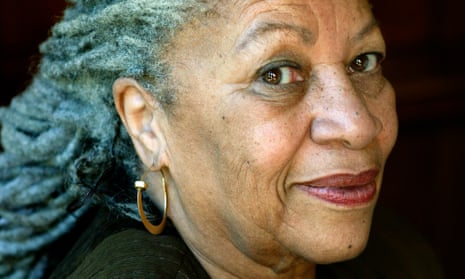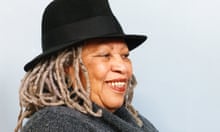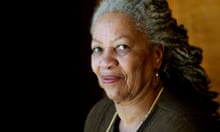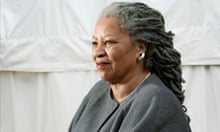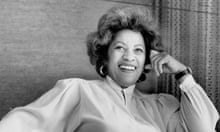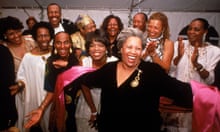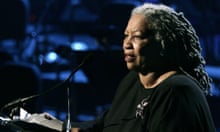A Nobel prizewinner, a Pulitzer prizewinner and a Princeton professor to boot, Toni Morrison is a famously grand writer, one not much given to generosity when it comes to interviewers (especially, I cannot help but notice as I read over her cuttings, if they happen to be female). One poor hack, in a funk and fast running out of inquisitorial steam, made the mistake of asking her if she wrote by hand. Morrison replied: 'You've really collapsed now, haven't you?'
I, too, fear saying the wrong thing, a dread that first took hold several weeks ago when - via a somewhat embarrassed publicist - I was asked how I was qualified to quiz America's 'national novelist'. What, for instance, was the name of the last American author I wrote about? At this point, my mind went completely blank. The only person I could think of was John Gray, author of Men Are From Mars, Women Are From Venus, which clearly wasn't the thing at all.
Oh please, Lord: let me do better today. As it turns out, I needn't have worried. Perhaps it is her jet lag that has made her softer at the edges, or the fact that she is travelling with one of her two sons; but whatever the cause, I get the impression that she is definitely not about to sink her sharp intellectual teeth deep into my ankles. We meet at Channings Hotel in Edinburgh, where she will be reading from her most recent novel, Love (just published in paperback, Vintage £6.99). Morrison is big and handsome, her grey braids swooped back into one oval mass so that they resemble - and, in certain circumstances, this might be appropriate - a wasp's nest.
Right now, she is taking a mid-interview cigarette break. She smokes with blithe enthusiasm and, between sips of Earl Grey tea, cracks one wheezy joke after another about American Presidents, past and present (she can be pretty dirty when she puts her mind to it). When Morrison laughs, her entire being seems to shake - as if this raspy guffaw is the engine that powers her. Morrison is 73 now, and the most feted - and loved - writer in all America (her novels sell in their millions thanks, at least in part, to their having been featured, more than once, on her friend Oprah Winfrey's television book club).
Busy with her ninth book, she feels she is working against the clock - 'I don't know how much time I have' - and, in many ways, she would far rather be closeted away in her boat house on the Hudson River in Rockland County than sitting here, talking, talking, talking. But Morrison has always talked. In the old days, this was because she wanted to build herself a readership, especially among African-Americans, and 'you can't do that if you're hiding behind a screen'. Now, though, there are more pressing reasons for making herself heard.
'Do I have a feeling of America going backwards? Sure. And I can't tell you how frightening it is - to see battles we thought we had already won... We're fighting to vote again. We fighting to protest. This is a major crisis. We're at the edge of a cliff. Do we fall off? Or do we step back?'
In her refined molasses voice, Morrison tells me that, personally, she has been in crisis mode for an awful long time. 'Ever since the election in 2000,' she says. 'Paralysed, aghast, seething.' (Morrison, I should warn, speaks as she writes, which is to say, elliptically; you are required to listen on, patiently, until her meaning becomes slowly apparent.) 'Really, it was a form of paralysis. Everyone was speechless. Then, after 11 September, there was a moment for us as a nation... for consolidation. Someone needed to act like a grown-up, and no one did. No one did. If Bush wins, the dread will move on to another level. Mishandled, wicked, duplicitous. Whatever happens with these wars, they cannot be waged properly by this administration.'
As one who grew up with segregation, Morrison finds the new suspicion that is abroad in her country especially troubling. The position in which, for instance, Arab Americans now find themselves - they are treated with fierce mistrust - is one that is sickeningly familiar to black Americans. 'The difference is that with black people, you had the summoning of the demons, the aliens [racial myth, the assumption of black irrationality among white people, is a common theme in Morrison's fiction]. This time, no restrictions are being made. There is a bigger rationale for it. They say, "These are the kind of people who... [commit terrorist acts]." But the difficulty is: Arab Americans, Arab anything. They're all over the world. Everywhere!' Her voice is now clotted with sarcasm. 'So it has the double horror, for people who think in those terms, of being permanent. It's the ultimate, permanent cause of war.'
Morrison considers that the best art is always political, and that the terrible irony of this whole situation is that it has a wonderful by-product in the form of an outpouring of words. It is not only that journalists have woken up. She believes that the climate is, however subliminally, filtering down into novels and theatre and film. She can sense it happening in her own work. 'I'm beginning to feel something unmanageable, and I have to work my way through it.'
Toni Morrison was born Chloe Wofford in 1931, and grew up in the small steel town of Lorain, Ohio, a place she has described as 'neither plantation nor ghetto'. Even so, black people had to travel separately on trains and were often barred from public amenities. But while her mother believed that her children were entitled to equal rights, and argued that they should be allowed into the local baths, for her father, a welder, racial battle lines were more clearly drawn. 'He disliked white people,' she once said. 'He distrusted everything they said, and everything they did. It was a moral thing. He thought there was no hope for them. He wouldn't let them into the house.'
In spite of this, Morrison insists that she felt the effects of poverty far more than racism and, for that reason, has never ceased to enjoy her earning ability. 'Nouveau riche is the best riche there is,' she says. 'I remember walking into a girlfriend's department, and screaming, "I'm rich!" Someone had offered me $50,000 for a book. My worries were over.' (In fact, this was a mere drop in the ocean; the Nobel prize alone was worth £563,000, and her advances now must be whopping).
After school, she went to Howard, an all-black university in Washington, where she met her husband, a Jamaican architect called Harold Morrison. They divorced after six years, when she was pregnant with her second child, and she moved to New York with her sons where, until 1983, she worked as a senior editor at Random House. She did not begin writing - in snatched moments, when her boys were asleep - until she was in her thirties, and she was almost 40 when her first novel, The Bluest Eye, the story of a black girl who longs to look like Shirley Temple, was published. This book, and her next, Sula, sold modestly, but her third, The Song of Solomon (1977), won the Critics Circle Award, and the five after were bestsellers.
The most well-known of these is still Beloved, the story of a runaway slave who has killed her daughter; it was this book, dedicated to the 60 million who died as a result of slavery, that won Morrison a Pulitzer (she, however, thinks that Love - an opaque novel about five women and the man who obsesses them, is her best; she has called it 'perfect').
In the past, she has spoken fondly of her days as a single mother - the other women in the neighbourhood calling round, helping out with babysitting and pot suppers. In the Sixties and Seventies, she thinks, women struggled more, but they were happier. Does she think we have boxed ourselves into a corner?
'More than that. There is an embarrassment of choices. But we have not really been trained to handle power. In the Eighties, I was appalled by the way women treated one another in the workplace. Women either invest men with too much power, or they strip them down so they are a weaker version of themselves.'
She despairs of some of her female students: 'They are hopelessly concentrated not on relationships, but on sex. They have taken the notion of "my body is my own", but they have focused on the most superficial part: breasts... Bits. It is really sad. Fashion reinforces it. So mommies look like their daughters, little children are sexualised out of their skulls. It's unbelievable the ages people begin to explore sex among their peers. That's commodification.'
For Morrison, 'commodification' - the default setting of those who live in a consumer society - is a disease, one that came into play even after 9/11, when patriots were urged to go out and shop, to get back into the malls, in order to keep the wheels of the economy turning. 'Why were we not told, "Stay home, get 30 days' food in your house?"'
If this thought appears to contradict her vehement opposition to the fear that the current administration likes to use to manipulate the electorate, well, too bad. A natural corollary of Morrison's hauteur is her insistent passion for making statements that, to most people, seem extreme, even a bit bonkers. In her essay 'Dead Man Golfing', she likened the trial of OJ Simpson to that of slave mutineers in Melville's novels, and has always believed him to be innocent (it is 'implausible' to suggest otherwise).
In 1998, she referred to Bill Clinton as the 'first black President', since he displayed 'almost every trope of blackness: single-parent household, born poor, working-class, saxophone-playing, McDonald's-and-junk-food-loving boy from Arkansas'.
Her success has not, she says, made her immune from racism. 'I don't pass without insults. Let me give you an example. I walk into the Waldorf Astoria in New York to check in. We're going to have a drink, and then my friend is going to go home. She stands behind me, as I check in. Finally, the guy says, "Oh, are you registering too?" He thought I was the maid. My friend was trembling with anger. It was so personal. But the irony of it was that I was on the cover of a magazine that month, and there were these posters with my face on them all over New York.'
But, in any case, she does not feel she is a success. I look at her, wide-eyed, as she says this. 'No! I haven't succeeded at anything,' she says. 'I have written good, and sometimes great books. But, for me, success is not a public thing. It's a private thing. It's when you have fewer and fewer regrets.'
The calm boast wrapped neatly around such mournfulness is disorientating. Is she being disingenuous? Is this the thin skin of the ego-maniac at work?
'My name is Chloe,' she says, the wonderful voice winding down now, like an ancient gramophone record. 'The Toni, a nickname, I got almost by accident. I didn't even mean to use it as the author name for my first book, but it was too late by the time I got to thinking about it. But Toni Morrison - she's over there. When I walk in the street, people talk to her and she's nice. I'm over here. There are still people in my family who call me Chloe. It's a psychological trick. I accept and agree with the enthusiasm for my work. But the other stuff, the celebrity stuff, it's of no interest to me at all.'
This declaration, so ripe with presumption and pop psychology, merits - demands, even - some thorough unpicking. But unfortunately, my time is up. My interviewee is eager to rejoin her entourage outside. That, or she's just desperate for a smoke.
